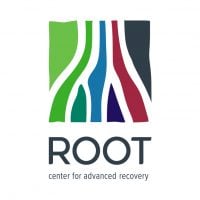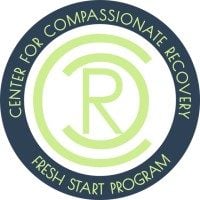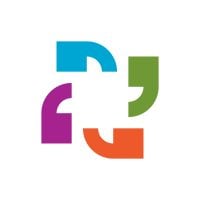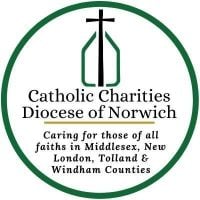
Catholic Charities - Behavioral Health Clinic - New London
Drug Rehab Center in New London, Connecticut
- Opioid Addiction
- Dual Diagnosis
- Drug Addiction
- Alcoholism
Catholic Charities Behavioral Health Clinic in New London, CT, offers drug rehab services at dual diagnosis, outpatient, and residential levels of care and accepts private health insurance.
About Catholic Charities - Behavioral Health Clinic - New London in Connecticut
Catholic Charities - Behavioral Health Clinic - New London is a drug treatment facility located in New London, Connecticut. This clinic specializes in providing treatment for individuals struggling with alcoholism, dual diagnosis, opioid addiction, and drug addiction. They offer a range of services and levels of care, including drug rehab, dual-diagnosis treatment, outpatient programs, and residential programs. Catholic Charities - Behavioral Health Clinic - New London accepts private health insurance and is affiliated with the Diocese of Norwich Catholic Charities.
Catholic Charities - Behavioral Health Clinic - New London offers a variety of services and treatment methods to individuals seeking help for addiction and substance abuse. Their dedicated team of professionals provides evidence-based treatment approaches to address the specific needs of each individual. Their services include individual and group counseling, medication-assisted treatment, relapse prevention strategies, and family therapy. Through their outpatient and residential programs, they provide a supportive and structured environment for individuals to work towards their recovery goals. The clinic emphasizes a holistic approach to treatment, focusing not only on addressing addiction but also on promoting overall well-being and personal growth.
Genders
Ages
Modality
Additional
Conditions and Issues Treated
Opioid addiction has become a significant health problem in the United States. In 2015, there were 91 opioid overdose-related deaths per day, with a substantial increase in mortality rate in 2014.
When opioid addiction has reached a point where a person’s life becomes unmanageable, treatment options are available to help them get sober. Treatment that includes medical care with medications and counseling can help a user transition into sobriety.
When someone in struggles with both addiction and mental or emotional illness, this is considered a dual diagnosis. Dual diagnosis treatment can include therapy for these issues to happen simultaneously, which will allow either of them to be treated effectively.
Sometimes people who have suffered from addiction disorder also suffer from co-occurring disorders such as depression, anxiety, bipolar disorder, etc., making them “dual diagnoses.” Dual diagnoses require specialized treatment programs where drug and alcohol addiction are addressed along with psychiatric illnesses. Some rehabilitation facilities provide patients suffering from cooccurrences a program with highly integrated services and a clean environment with few distractions to help them succeed.
Levels of Care Offered
This center offers a variety of custom treatment tailored to individual recovery. Currently available are Drug Rehab, Dual-Diagnosis, Outpatient, Residential, with additional therapies available as listed below.
Outpatient treatment is often used for drug addicts in drug rehab. Outpatient treatment consists of counseling and therapy sessions. This form of treatment is also called ‘day-treatment’. The outpatient treatment process begins with the addict’s initial detox period, lasting about ten days.
Outpatient treatment is used for those who are at moderate risk for ‘slipping back’ into the addiction, for those who:
- Are not currently experiencing any side effects from withdrawal and can handle social pressure
- Can handle stressors that might trigger relapse
- Have a stable living environment or have moved out of their previous environment, which was not conducive to being sober
- Have a support system that allows them to go to a facility a few times a week while still keeping their current responsibilities
- Have no legal obligations, being either on parole or probation, that require them to seek treatment at a mandatory facility
- Are not currently experiencing any side effects from withdrawal and can handle social pressure
- Have a stable living environment or have moved out of their previous environment, which was not conducive to being sober
Residential treatment programs are those that offer housing and meals in addition to substance abuse treatment. Rehab facilities that offer residential treatment allow patients to focus solely on recovery, in an environment totally separate from their lives. Some rehab centers specialize in short-term residential treatment (a few days to a week or two), while others solely provide treatment on a long-term basis (several weeks to months). Some offer both, and tailor treatment to the patient’s individual requirements.
Therapies & Programs
Because no single treatment is effective for all addicts, the goal of treatment and therapy should be to figure out what works best for each individual. Tolerance and withdrawal levels differ from person to person, affecting the treatment intensity required. Addiction treatment should aim to help addicts develop healthy coping mechanisms for dealing with their addiction and its underlying causes.
Couples therapy works with clients and significant others in a professional capacity to improve relationship dynamics. This can be helpful for addicts who are trying to marry the idea of recovery into their work, family, social lives – any aspect that has to do with relationships. Through counseling sessions, addicts will have an opportunity to talk about their addiction with professional partners.
Family therapy is beneficial for people who are in addiction treatment services because it offers addicts the opportunity to work with their family members to better understand what led them to make choices that contributed to their addiction.
This type of therapy helps family members reach a deeper understanding of how they can best support their loved one during recovery. It also helps the addict better understand their own motivations and triggers that led them to turn to substance abuse.
Family therapy can help addicts in the following ways:
- Assists family members in processing difficult feelings so they don’t blame or resent recovering addicts
- Assists family members in understanding how addiction has impacted the addict and everyone who is involved with them
- Allows the addict to take responsibility for their actions, while encouraging improved communication skills
- Helps family members understand how to best support an individual in recovery so addicts don’t relapse again.
Group therapy can help build a stronger support system and give addicts in New London, CT insight into their addiction that they gain through shared conversations. Group therapy occurs in a controlled group environment, exclusive of one on one meetings. This makes it safer for patients to feel comfortable sharing the struggles they’re going through and gaining perspective.
Trauma therapy is beneficial for people who are recovering from drug addiction because it helps them heal from past traumas that may have caused them to turn to harmful substances or led them to experience negative emotions that contributed to their destructive behaviors.
This type of treatment works by processing difficult experiences so individuals can learn how to process these events without having to turn to substances for coping.
Trauma therapy can help addicts in the following ways:
- Helps individuals understand their experiences and emotional responses to difficult events, including why they turned to drugs or alcohol
- Provides them with comfort and support while working through difficult emotions related to these traumatic experiences
- Offers an opportunity for addicts to have a voice and be heard, which can improve their self-esteem
- Can help them develop coping skills so they can better respond to triggers instead of turning to substance abuse.
Payment Options Accepted
For specific insurance or payment methods please contact us.
Is your insurance accepted?
Ask an expert, call (888) 674-0062
Diocese of Norwich Catholic Charities Associated Centers
Discover treatment facilities under the same provider.
- Catholic Charities Diocese - Norwich Office in Norwich, CT
- Catholic Charities - Behavioral Health Clinic - Middletown in Middletown, CT
- Catholic Charities Diocese in Middletown, CT
- Catholic Charities - Behavioral Health Clinic - Norwich in Norwich, CT
- Catholic Charities - Behavioral Health Clinic - Willimantic in Willimantic, CT
Learn More About Diocese of Norwich Catholic Charities Centers
Additional Details
Specifics, location, and helpful extra information.
New London, Connecticut 6320 Phone Number(860) 443-5328 Meta DetailsUpdated November 25, 2023
Staff Verified
Catholic Charities - Behavioral Health Clinic - New London Patient Reviews
There are no reviews yet. Be the first one to write one.

Location
28 Huntington Street
New London, CT 6320
(860) 443-5328
Diocese of Norwich Catholic Charities
Language
Quick Reference
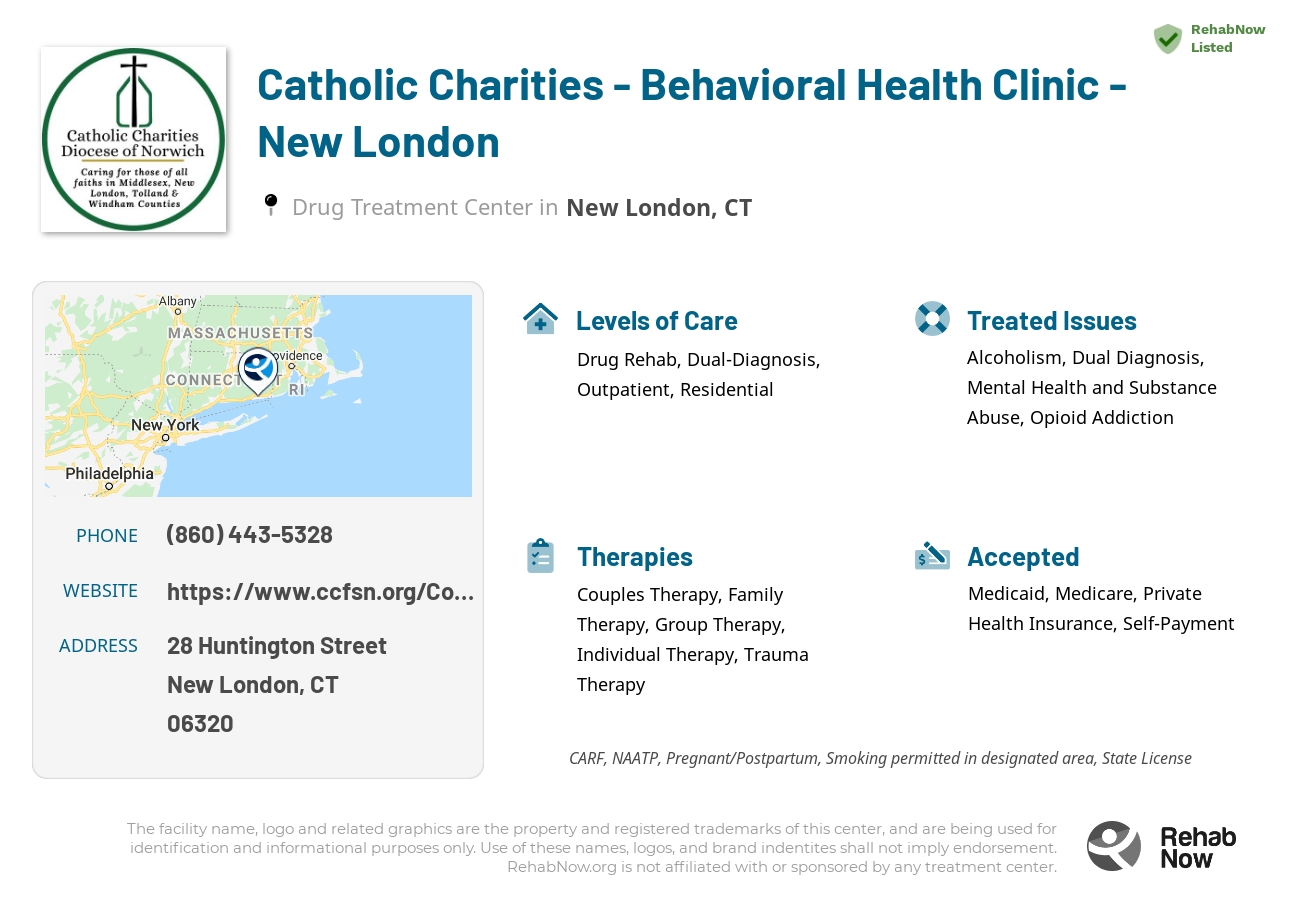
- About Catholic Charities - Behavioral Health Clinic - New London in Connecticut
- Conditions and Issues Treated
- Levels of Care Offered
- Therapies & Programs
- Payment Options Accepted
- Diocese of Norwich Catholic Charities Associated Centers
- Additional Details
- Catholic Charities - Behavioral Health Clinic - New London Patient Reviews
New London, Connecticut Addiction Information
Connecticut has a higher rate of substance abuse and addiction than the national average. The state ranks in the top 10 in the country for illicit drug dependence among those ages 18 to 25. In 2010, there were 9,211 people admitted to an alcohol treatment facility for alcohol abuse combined with a secondary drug. Connecticut ranked fifth in the United States of America for the number of fatalities involving drunk driving in 2014.
The use of drugs and alcohol is a major problem in New London, Connecticut. Since 1999, there have been more than 1,000 drug overdoses in the city. The number of people using marijuana has increased by 50% since 2013. About 15% of drug users in New London are under the age of 18. Some common types of treatment include detoxification, residential, and outpatient treatment.
Treatment in Nearby Cities
- Darien, CT (73.8 mi.)
- Middletown, CT (32.0 mi.)
- Vernon-Rockville, CT (37.7 mi.)
- Clinton, CT (22.7 mi.)
- Bristol, CT (49.2 mi.)
Centers near Catholic Charities - Behavioral Health Clinic - New London



The facility name, logo and brand are the property and registered trademarks of Catholic Charities - Behavioral Health Clinic - New London, and are being used for identification and informational purposes only. Use of these names, logos and brands shall not imply endorsement. RehabNow.org is not affiliated with or sponsored by Catholic Charities - Behavioral Health Clinic - New London.
